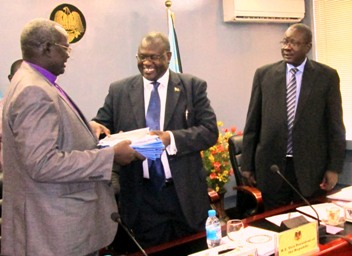South Sudan’s newly appointed national reconciliation committee takes over
May 5, 2013 (JUBA) – The national reconciliation committee recently appointed by South Sudan’s president Salva Kiir has officially began its mandate of overseeing efforts to reconcile the various communities in the country and identify the root causes of the conflicts with the aim of addressing them.

South Sudan’s president issued a presidential order last month dissolving the former committee chaired by presidential adviser Tor Deng Mawien and established a new committee.
The documents handed over included the road map for the national reconciliation process, Conflict Mapping of all counties, detailing areas of conflicts, as well as files of the recently trained 200 peace mobilizes from the ten states and Juba, among others.
In extensive remarks to the new committee, VP Machar urged the committee to work hard and try to reconcile the communities that were separated by war.
Machar reminded the new committee about the complexity of the reconciliation program, urging the team to address all the interrelating factors that cause conflicts in order to achieve true reconciliation in the country.
He also appealed to the international partners including the international Initiatives of Change and the Swiss government to continue supporting the new committee.
Machar also reminded the team that even those in the Diaspora have become tribal internet warriors due to the high level of trauma they possess and also urged the new committee to design ways to help them relieve the trauma.
“It is good that they express their feelings; but the question is whether it cures their trauma particularly when they are hostile to one another in the internet,” he inquired.
The Presidential advisor and former chairman of the organizing committee for national reconciliation, Tor Deng Mawien, also briefed the new committee on the activities the committee had so far achieved.
Mawien said the council of ministers had already approved 8.2 million South Sudanese pounds (SSP) in support of the process, which the committee should pursue with the finance ministry.
However he lamented that his committee had no assets or offices to hand over because they were using his presidential advisory office.
Archbishop Daniel Deng Bul, in his remarks commended the previous committee for thorough documentation and preparations they have already made.
He appreciated the guidance provided by the Vice President and appealed to the leadership to continue doing so in order to succeed in its mission.
“I don’t think this committee formed by the president will do it alone. It will be a big mistake,” Archbishop Bul said.
“The field I am coming into is not my field; it is not a religious field,” he added, acknowledging the complexity of the reconciliation process.
Bul however expressed his commitment along with his colleagues including Archbishop Paride Taban of Torit Diocese to try their best.
He was previously appointed by Kiir to chair a peace and reconciliation process in the troubled Jonglei state last year. He faced difficulties when the Murle community of Pibor county in the state accused him of allegedly siding with his native Dinka Bor in the mediation process.
However, all six of Jonglei’s groups signed a peace deal witnessed by President Salva Kiir Mayardit.on May 6, 2012 in Bor. There followed a period of increased security but cattle raids and attacks by rebels in the area have increased in recent months.
(ST)
